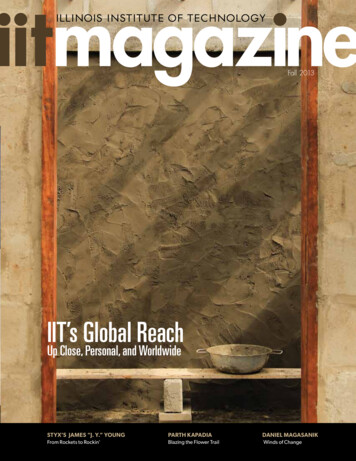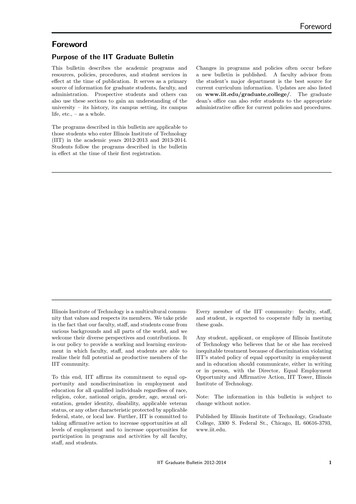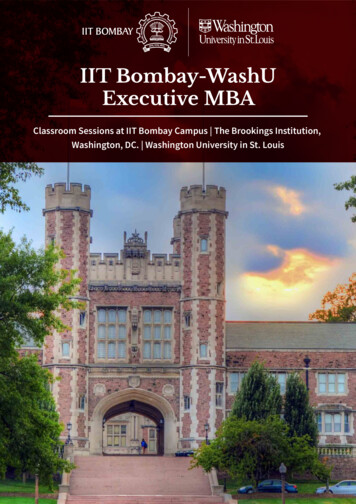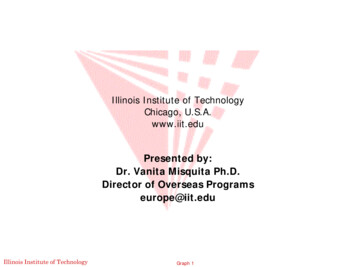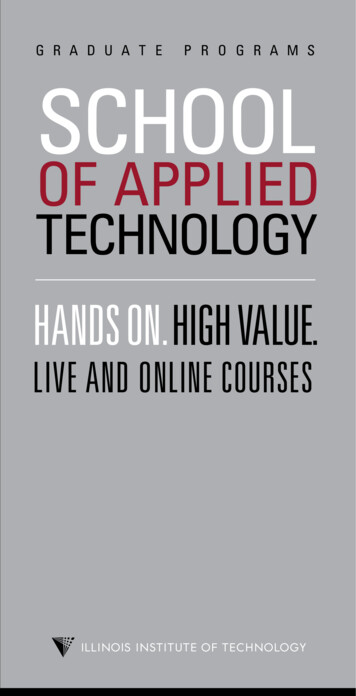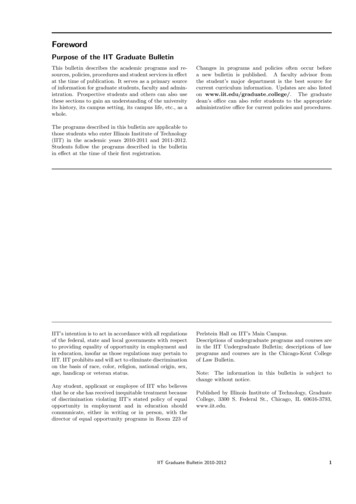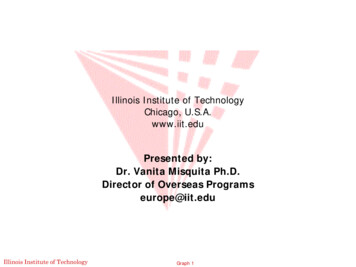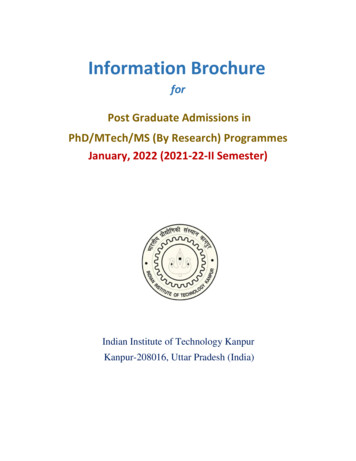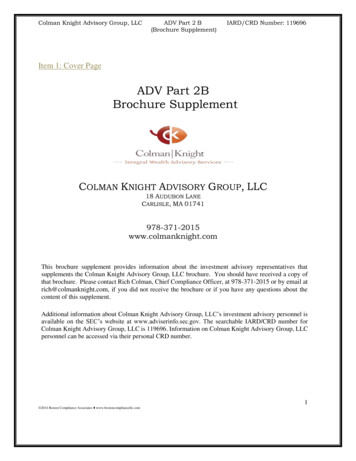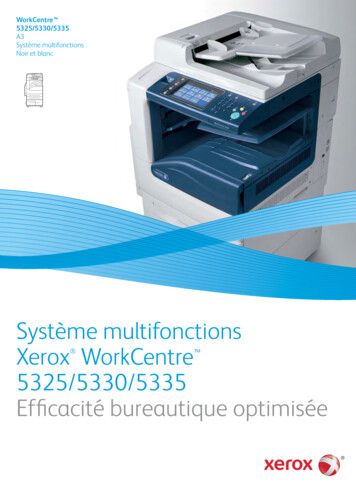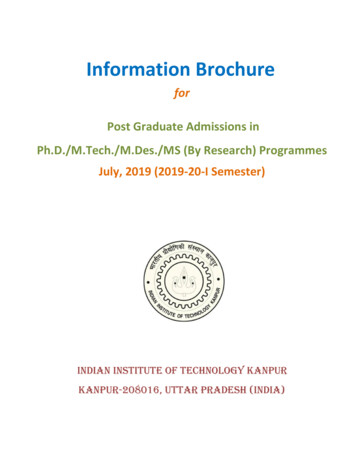
Transcription
Information BrochureforPost Graduate Admissions inPh.D./M.Tech./M.Des./MS (By Research) ProgrammesJuly, 2019 (2019-20-I Semester)INDIAN INSTITUTE OF TECHNOLOGY KANPURKANPUR-208016, UTTAR PRADESH (INDIA)
AEROSPACE ENGINEERINGThe Department of Aerospace Engineering offerscomprehensive teaching and research programs atundergraduate (UG) and postgraduate (PG) levels leadingto B Tech, B Tech-M Tech dual, M Tech, MS (research)and PhD degrees. The specializations associated to thePG programs are available in four major streams: (i)Aerodynamics, (ii) Propulsion, (iii) Flight Mechanics,(iv) Structures.The Department is actively involved in sponsored R&D andconsultancy projects funded by a range of defense and civil organizations. Some of themare,Aeronautics R&D Board, DRDO, ISRO, HAL, NAL, ADA, DST, Delhi Metro RailwaysCorporation, NAL, Indo-French Centre for the Promotion of Advanced Research (IFCPAR), TERI,PCRA, etc.FACULTY MEMBERSA. C. Mandal, PhD (IISc Bangalore): ExperimentalAerodynamics, Flow instability and transition,Turbulent Shear flow.A. K. Ghosh, PhD (IITK): Flight Mechanics, NeuralNetworks, Flight Testing.A. Tewari, PhD (Missouri-Rolla): Flight Mechanics,Aeroservoelasticity, Space Dynamics and Control.A.Kushari, PhD (Georgia Tech.): Propulsion,Combustion, Liquid Atomization, Flow Control.Ashoke De, Ph.D(LSU):CFD, Turbulent combustion,Gas turbine propulsion.Abhishek, PhD (University of Maryland, College Park):Rotorcraft aeromechanics, futuristicVTOL/STOL systems, aerial vehicle design, Unmanned Aerial Systems, Inverse flight dynamics andwind turbines.Ajay Vikram Singh, PhD (University of Maryland, College Park): Combustion and Reacting Flows,Combustion Generated Functional Nanoparticles, Soot Formation and Oxidation, Fire Dynamics,Detonations and Explosions.C. S. Upadhyay, PhD (Texas A&M): Computational Mechanics, Damage Mechanics.Debopam Das, PhD (IISc Bangalore): Theoretical and Experimental Fluid Dynamics, Aeroacoustics,Instability & transition, Vortex Dynamics. Unsteady Aerodynamics, Bird's and Insect's Flight.D. P. Mishra, PhD (IISc Bangalore): Combustion, CFD ofChemically Reacting Flows, Propulsion, Heat Transfer.G. M. Kamath, PhD (University of Maryland, College Park):Structural Health Monitoring, Composite Materials and Structures,Structural Dynamics, Condition Monitoring, Machine Learning,Aeroelasticity.Kamal Poddar, PhD (UC, San Diego): Aerodynamics,Turbulence, Low and High Speed Flows.Mangal Kothari, PhD (University of Leicester): Optimal Control,Nonlinear and Adaptive Control, Flight Vehicle Guidance and Control, State Estimation, MotionPlanning and Cooperative ExperimentalHypersonicAerothermodynamics, High Enthalpy Test Facilities, Shock Waves.
Navrose, PhD (IIT Kanpur): Fluid Mechanics, Fluid-Structure Interaction, Optimization, FlowStability and ControlPritamChakraborty, PhD (Ohio State University): Mesoscale mechanics for plasticity, fatigue, creepand fracture; FEM; Multi-scale methods.P. M. Mohite, PhD (IIT Kanpur): Damage Mechanics of Laminated Composites, Composites, FiniteElement Analysis.R. Kitey, PhD (Auburn University): Fracture Mechanics, Composite Materials, Experimental StressAnalysis, Optical Metrology, Thin Films, Finite Element Method.Raghavendra P. Kukillaya , PhD (Princeton University, New Jersey, USA):Aircraft and AirshipFlight Dynamics and Control, Systems Modelling,Simulation and Design, Optimal Control,Biomechanics.Rakesh Kumar, PhD (Penn State): Hypersonics, Rarefied Gas Dynamics, Microfluidics, MolecularDynamics, Heat Transfer & Thermal Design.S. Kamle, PhD (Purdue): Experimental Stress Analysis, Smart Materials.Sanjay Mittal, PhD (Minnesota): Unsteady Aerodynamics, CFD, FEM, Low speed Wind-TunnelTesting,Bluff Body Flows, Shape Optimization, Sports Balls, Flows in air intakes.Sanjay Kumar, PhD (Caltech): Fluid Mechanics - bluff body wakes, shock-accelerated flows, shockwaves, shock tubes.Sathesh Mariappan, PhD (IIT Madras): Fundamentals of thermoacoustic interactions, Application ofdynamical systems' theory to thermo fluid systems, Optical flow diagnostics, Acousticmeasurements.S.Saderla, PhD (IIT Kanpur): Online System Identification, UAV Design and Flight tests,Experimental Flight dynamics.Tapan K. Sengupta, PhD (Georgia Tech): Transition and Turbulence, CFD, AerodynamicsVaibhavArghode, PhD (University of Maryland, College Park): Combustion, Heat Transfer, FluidMechanics, Experimental Methods, Computational Fluid Dynamics.P. D. Mangalgiri, PhD: Composites, fracture and fatigueDipak K. Giri, PhD (IIT Kharagpur): Spacecraft Dynamics and Control, Space Explorations: On-orbitServicing, Space Debris Removal, Orbital Infrastructure Design in LEO,MEO,GEO.PROGRAMS AND ADMISSIONThe masters programs are designed to impart students withvarious aspects of aerospace engineering throughintroductoryandadvanced level courses, followed by theresearchwithin their field of specialization. The doctoralprogram is aimed at assisting students acquiring proficiency intheir chosen area of research through comprehensive coursework and extensive in-depth research. All PG programsculminate into thesis/dissertation.The Department of Aerospace Engineering accepts students from various disciplines for its PGprogram. The detailed admission procedure along with the eligibility criteria is ocedure.Some of the key information in regards to theapplication is mentioned below.M.Tech: Candidates with a valid GATE score and the degree inone of the following disciplines can apply for the M Tech program.
Engineering: Bachelors degree in Aeronautical/Aerospace, Mechanical, Automobile, Production,Civil, Chemical, Naval Architecture, Electrical, Electronics/Electronics and Communication,Metallurgy /Metallurgy &Material Science, Instrumentation, MechatronicsScience: Four years BS degree in Physics, Mathematics OR MSc degree in Physics, Mathematicsand Engineering Physics with valid GATE scoreThe requirement of GATE score is waived off for the external and sponsored candidates.M.S. (Research):Candidates with B Tech/BS (4-year)/M. Sc. degrees and a valid GATE score canapply for this program. The GATE score is waived off for the external and sponsored candidates.B. Tech-M. Tech Dual: Students in B. Tech program at IITKcan apply for B Tech-M Tech Dualdegree program during his/her third year of the course work.PhD: Candidates with following degree can apply for the PhD program.-Masters degree in engineering-Masters degree in science with a valid GATE/UGC/CSIR score-Excellent academic record in B. Tech programand a valid GATE score (Application can besent during the final year or after completing the B. Tech program).The GATE score is waivedoff for the students from CFTIs.Sponsored/External/Part time candidate should have a minimum 2 years of R&D experience (orrelevant) in the field of Aerospace Engineering.COURSESA student is admitted to thepost graduate program in one ofthe four major streams s). Based on the departmental policiesthe student will be allocated a thesis supervisor/s during thefirst semester of the program. In case the student is nce/assistance will be provided by the department.A student admitted in M. Tech program is required tocomplete a minimum 72 units of course work(equivalent of 8 courses) to a satisfactory level. Therespective requirement for the M.S.(Research)students is 36 units. A student admitted in a PhDprogram is required to complete a minimum of 36units of course work (equivalent of 4 courses) to asatisfactory level, followed by a cialization the student will be advised byDPGC/Thesis Supervisor to register for the requiredcourses.
LABORATORIES AND FACILITIESThe department has several well established laboratories focusing onvarious research and academic activities. They are: High Speed and LowSpeed Aerodynamics Lab, Propulsion Lab, Combustion Lab, AdvancedCombustion and Acoustics Lab, Fire Lab, Computational Propulsion Lab,Structures and Advanced Materials Characterization Lab, StructuralAnalysis Lab, Aeromodeling Lab, Unsteady Aerodynamics Lab,Helicopter Dynamics and Control Lab, CFD Lab, High PerformanceComputing Lab, Fluid Mechanics Lab, Flight Lab and National WindTunnel Facility (3 m x 2.25 m test section).The experimental facilities in these labs include, low speed wind tunnels, high speed blow downtunnel, high speed jet facility, water tunnel, soap film tunnel, anechoic chamber for noisemeasurements, hot wire and laser Doppler anemometry, time resolved and stereoscopicPIV;cascade tunnel, continuous combustion unit and gas turbine test rig; Malvern Spraytech particle sizeanalyzer, Gas Chromatograph; UTMs, Dynamic Impactor, DMA, DSC, TGA, TMA, Thermalevaporator, Spin coater, Phased Array Scanner, Autoclave, Prepreg forming, Laser spallation,Michelson Interferometer, multi-material 3D printing facility, Vicon Motion capture system, coaxialrotor hover test stand; Flight laboratory with four powered airplanes and several gliders with anoperational aerodrome for flight research.
BIOLOGICAL SCIENCES AND BIO ENGINEERINGThe Department of Biological Sciences and Bioengineering (BSBE) was established in September,2001. The department offers both undergraduate (B.Tech) and postgraduate programs (M.Tech. andPh.D.) and the faculty conduct research in diverse areas of basic and applied biology. Ongoingresearch projects are spread in broadly three major domains that include (a) molecular, cellular anddevelopmental biology, (b) structural and computational biology and (c) bioengineering. A majoremphasis is on understanding the fundamental aspects of cell differentiation and growth,regenerative medicine, elucidating protein structure-function relationship, and engineeringapproaches to understand complex biological systems, providing economical detection methods anddevices and generating new medicine systems. The department has attracted funding from majornational and international agencies including the Wellcome-DBT India Alliance, Indo-UK Sciencebridge program, UKERI, DBT, DST, CSIR, DAE, ICMR and DRDO to name a few. BSBE faculty andstudent members have received many awards and honors in recognition of their excellence inresearch.The department currently has seventeen members in its faculty with expertise in diverse areas ofresearch.FACULTYAmitabha Bandyopadhyay, Ph.D. (Albert Einstein College of Medicine, New York): skeletaldevelopment and differentiation; metabolomics.Arun K. Shukla, PhD (Max Planck Institute of Biophysics, Frankfurt, Germany): Structuralbiology of membrane proteins, X-ray crystallography, cryo-EM, cellular signaling and combinatorialbiology.Ashok Kumar, Ph.D. (IIT Roorkee): Biomaterials, tissue engineering, regenerative medicine,nanobiotechnology, stem cell research, drug screening and delivery, cryogel technology bioprocessengineering and environmental sciences.Ashwani Kumar Thakur, Ph.D. (Inst. of Microbial Tech., Chandigarh) : Protein aggregation indiseases and therapeutic design, self assembly of proteins, and biopharmaceuticals.Bushra Ateeq, Ph.D. (AMU, Aligarh): Molecular oncology, Genetic alterations, Cancerpathogenesis, diagnosis and therapeuticsDhirendra S. Katti, Ph.D. (Bombay Univ.): Tissue engineering, biomaterials, drug delivery systemsand nanobiotechnology.Dibyendu K. Das, Ph.D. (IACS, Kolkata): Molecular Basis of Virus Entry; Host-Pathogeninteraction; Developments of Novel Single molecule Imaging and Manipulation Techniques.Ganesh S, Ph.D. (BHU, Varanasi): Neurobiology of disorders, stress biology, and human genetics.Jayandharan G Rao, Ph.D (Christian Medical College, Vellore): Gene therapy; human moleculargenetics.Jonaki Sen, Ph.D. (Albert Einstein College of Medicine, New York): Morphogenesis anddifferentiation of the retina and various regions of the brain; vertebrate developmental neurobiology.
Mainak Das, Ph.D. (Univ. of Central Florida, Orlando): Bioelectronics, Green Energy, Physiology& Sensor.Nitin Gupta, Ph.D (University of California, San Diego): Neuroscience, insect olfaction,computational biology, digital interventions for mental health.Nitin Mohan, Ph.D. (Academia Sinica, Taiwan): Optical engineering, super-resolution microscopy,Intracellular transport and neurodegeneration, lysosome mediated nutrient sensing anddysregulations in diabetes, obesity.Pradip Sinha, Ph.D. (BHU, Varanasi): Cancer genetics, cancer-induced paraneoplastic syndromes,metabolic disorders such as diabetes, and bio-entrepreneurial venture for drug discovery in the fruitfly, Drosophila, modelSankararamakrishnan R, Ph.D. (IISc, Bangalore):membrane proteins and biomolecular simulation.Bioinformatics, molecular modelling ofSaravanan M, Ph.D. (IISc, Bangalore): Chromatin remodeling, DNA repair and Stress biology.Santosh Kumar Misra, Ph.D. (IISc, Bangalore): Biosensors, 3D-printed biomedical devices,Nanocomposites and Personalized medicine.FACILITIESBSBE offers its members with a wide variety of high-end equipments. Some of these includebioinformatics facility (servers, workstations, and software modules for high performance computing),material characterization facility (SEM, micro-CT, rheometer, mechanical testing and fabricationfacilities), cell sorting and imaging facility (cell sorter, confocal microscope), genomic facility (DNAsequencer, microarray scanner and real-time PCR machines), centrifuge facility (ultra-speed, largevolume and multipurpose centrifuges), sonication facility (bath sonicator, probe sonicator with microand mini probes), gel imaging station, protein purification and characterization facility(Chromatography, HPLC and FPLC systems), protein crystallization facility (X-ray data collectionfacility with cryo cooling features), tissue culture facility (culture rooms for cell, organ and viruscultures), histopathology facility (tissue processing unit, automated microtome, and cryostat),electrophysiology facility, calcium imaging set-up, and a transgenic facility (transgenic facility formouse, chicken, Drosophila, C.elegans, mosquitoes and zebra fish).
M.Tech. in BSBE (4 Semesters)Master of Technology (M.Tech.) program in BSBE meets a variety of career objectives in researchand industry. The program is also supported by the Department of Biotechnology (DBT), Govt.of India. The Program is for four semesters of which the last two semesters involve hands-ontraining and research. Midway through the program, students may apply for switchover to thePh.D. program of BSBE. The program is designed for students from both biology and non-biologybackground.WHO CAN APPLY?Candidates who have a Master's degree in any area of science (mathematics, physics, chemistry orlife sciences) or Bachelor’s degree (4 year program) - Bachelor's degree inTechnology/Engineering, Medicine (MBBS), Pharmaceutical (B.Pharm.), Agricultural or VeterinarySciences are eligible to apply. Applicants should have secured a minimum CPI of 6.0 (or 60 percentmarks) in their qualifying degree (and should be at least seven percent higher than the minimumpass marks/CPI) and should either have a valid GATE score or qualified in the national level testsconducted by the UGC, CSIR, DBT, ICAR or ICMR. The requirement of a GATE score is waived forM.B.B.S. degree holders and for engineering graduates from IITs with an overall CGPA of 6.5and a CGPA of 8.0 during the last two semesters. Candidates appearing in the final examinationsof the qualifying degree are also eligible to apply.Ph.D in BSBEPh.D. Program in BSBE is intended for students interested in carrying out distinguishedscholarly activities. Excellence in research apart, the program envisages comprehensivedevelopment of students for leadership in science and engineering in both industry and academia.Therefore, the Ph.D. Program involves course work covering diverse areas of biology andbioengineering for competence in both analytical and quantitative skills. We encourage studentsfrom any discipline (including non-biology background) to apply as they will be given a formal trainingin biology through a well formulated course work in basic biology.WHO CAN APPLY?Candidates should meet one of the following 4 conditions. Candidates appearing in the finalexaminations of the qualifying degree are also eligible to apply.(1) Should have a master’s degree in engineering (ME/M.Tech.), or medicine (M.D.) or M.Sc. (Agri)or equivalent with minimum of 55 percent marks/ 5.5 CPI (on a 10 point scale) as long as it is notless than the minimum pass marks/CPI.OR(2) Should have a bachelor’s degree in engineering (B.E/B.Tech) or pharmacy (B.Pharm)or Bachelor’s degree (4 year program) with a minimum of 75 percent marks/7.5 CPI, and a validGATE score or qualified in the JRF of UGC, CSIR, DBT, ICAR or ICMR. The requirement of GATEscore is waived for candidates with bachelor's degree in engineering from the centrally fundedtechnical institutes (CFTIs).OR
(3) Master’s degree in sciences or an allied area (M.Sc.), satisfying each of the following criteria mayalso be considered.(a) a minimum of 65 percent marks/6.5 CPI in the master’s degree.(b) first division in bachelor’s degree, and(c) UGC, CSIR, DBT, ICAR or ICMR junior research fellowship (JRF) OR 95 percentile or higher inGATE.OR(4) MBBS degree holders with a minimum of 60% marks in the qualifying degree.
CHEMICAL ENGINEERINGThe Department of Chemical Engineering is among the five departments established at the inceptionof IIT Kanpur in 1960. Along with the other pioneer departments, it ushered in a new paradigm inundergraduate engineering education that fosters the creative thinking process in a very open andvibrant academic environment. From an early emphasis on developing and perfecting theundergraduate curriculum to nurturing a fledgling post-graduate research program to significantlycontributing to applied and fundamental ChE research, we have grown from strength-to-strengthover the past five decades.A hallmark of our Department is the emphasis on quality education as reflected in the over 36 “laborof love” textbooks written by our faculty, many receiving international acceptance. This iscomplemented by a strong research ethos, carefully nurtured by the pioneers and effectively passedon from one generation to the next. The significant post-liberalization research funding has broughtin a critical mass of young, talented and motivated faculty immersed in research in the frontier areasof complex fluids, micro-reactors, nano-technology, adhesion, molecular simulations andbiocomputation and energy systems. This is in addition to research in traditional areas of fluiddynamics, conventional/new separation processes, catalysis, polymer engineering and processdesign, control and intensification. The very diverse research portfolio is our core strength thateffectively complements quality education.ACADEMIC PROGRAMMESThe department offers undergraduate (B Tech) and postgraduate (M Tech, MS and PhD) degrees inChemical Engineering. The admission process and graduation requirements are briefly summarizedbelow.UNDERGRADUATEBachelor of Technology (B Tech)Duration: 4 yearsAdmission: Through the Joint Entrance Examination (JEE) advanced JEE.Courses: The ChEB Tech program comprises a four semester “core” program of courses in basicsciences, engineering sciences, humanities and computer programming, followed by a two yearprofessional program, consisting of departmental professional courses and several electives. The fullload for a semester is roughly 5 courses (50 credits). At least 405 credits must be completed forgraduation with the option of additional research credits.Research: In addition to course work, our students have the option of carrying out research with afaculty mentor in their last three semesters.Double Major: Students can also opt to do a double major with an additional year of coursework.Thus for example, by appropriate planning of his/her program, a student admitted to ChE maygraduate with a double major in Chemical Engineering and Computer Science in five years.B Tech - M Tech (Dual Degree)Duration: 5 yearsAdmission: Undergraduate students can opt to convert to dual degree after completion of their 5th,6th or 7th semester.Courses: The first four years of the program are almost identical to the B Tech course work.Research: The last two semesters and two summer terms are devoted entirely to research work.Students work under a faculty research supervisor on a challenging research problem. In the fifthyear, a scholarship currently at Rs 12,400 per month is given subject to a minimum CPI of 8 orattaining more than 60 percentile GATE score.
POSTGRADUATEThe Department offers a Master of Technology (M Tech), a MS (Research) and a Doctorate (PhD)degree in Chemical Engineering. These programs are research centric and prepare the student for aproductive research career. The rigorous coursework and research provide a healthy balance ofbreadth in ChE fundamentals and depth in their chosen research field.Master of Technology (M Tech)Duration: 2 yearsAdmission: Through Graduate Aptitude Test in Engineering (GATE). The examination is usuallyannounced in the month of August and held in February across the country. Sponsored candidatesfrom the industries as well as research organizations with appropriate experience need not havequalified GATE.Course requirements: The students take six courses (of which at least three are in compulsoryareas of Reaction Engineering, Thermodynamics, Transport Phenomena and Mathematics orNumerical Methods, the remaining from among several state-of-art electives).Research: Students have usually do 10-12 course units (including summer term) of research. Intheir research project, students often work on research problems with individual faculty members, orare involved in sponsored projects from industry or government funding agencies. MHRD offersscholarships to students getting admission through GATE currently at Rs 12,400 per month.Scholarships from research projects are also available.Master of Science by Research (MS Research)Duration: 2 yearsAdmission: Admission is generally made in both the semesters in a year, i.e., July andDecember.Selection is done through a written test followed by interview. Candidates with a BTech/MSc background and a minimum of 55% marks in their qualifying exam are eligible to apply. Avalid GATE score (for B Tech degree holders) or valid CSIR-NET score (for MSc degree holders)isalso required. Sponsored candidate should possess a minimum of 55% marks in their qualifyingexam (no gate score needed).Course requirements: The students take four courses (of which at least three are in compulsoryareas of Reaction Engineering, Thermodynamics, Transport Phenomena and Mathematics orNumerical Methods, the remaining from among several state-of-art electives).Research: Students usually do 12-14 course units (including summer) of research. In their researchproject, students often work on research problems with individual faculty members, or are involved insponsored projects from industry or government funding agencies. They must be sponsored throughproject funding from their thesis supervisors (or) financial sponsorship must come from their parentindustrial organization.Doctor of Philosophy (PhD)Duration: 4-5 yearsAdmission: Admission to the PhD programme is generally made in both the semesters in a year,i.e., July and December. Selection is done through a written test followed by interview. Industriesand research organizations may also sponsor a candidate for admission to the PhD program.Course requirements: The students take a minimum of four courses (out of which two are in thecompulsory areas) to develop expertise in ChE fundamentals as well as to complement theirresearch work.Research: Post coursework (up to 1 year), students work on a research problem of their interestunder the guidance of a faculty mentor(s). Working on a particular problem for 3-4 years is a unique
experience that helps in developing a scientific temper along with the associated technicalcommunication skills. The typical norm for graduation is 3-5 publications (submitted or accepted) inreputed peer-reviewed journals. MHRD offers scholarships currently at Rs31-35,000 per month tofull time PhD students. Scholarships from research projects are also available.ELECTIVE COURSESA range of graduate-level elective courses are developed and offered by the faculty. These coverfundamentals at an advanced and more abstract level and also help keep abreast with the latestdevelopments and the state-of-the-art in niche specialized research areas. These courses prepareand enable the students to probe deeper into their research problems. A sample of the electivescurrently on offer is provided.New Separation Processes, Thermodynamics of Fluids and Mixtures, Principles of HeterogeneousCatalysis, Applied Statistics for Chemical Engineers, Optimization, Mechanics of Soft Materials,Introduction to Nanoscience and Technology, Polymer Science and Technology.ReactionEngineering of Polymers, Principles of Polymer Processing, Molecular Theories of PolymericSystems, Environmental Pollution and Control, Engineering, Applications of Rheology, AdvancedProcess Dynamics and Control, Two-Phase Flow and Heat Transfer, Design of Fluid-ParticleSystems, Colloids and Interface Science, Engineering Modelling and Simulation in ChemicalEngineering, Introduction to Polymer Physics, Rheology of Soft Matter, Introduction to MolecularSimulation, Analytical and Material Characterization Techniques for Engineers, Introduction toHydrodynamic Stability, Electrochemical Energy Conversion and Storage, CFD of MultiphaseReactors, Nuclear Chemical Engineering, Structure and Rheology of Complex Fluids, ProcessEngineering Principles in Microelectronics Fabrication.FACILITIESThe department houses state-of the-art facilities and equipment to support research at the cuttingedge. Besides the central facilities at the Institute level, we have our own workshop forfabrication of customized experimental set-ups; sophisticated analytical instruments such as SEM,XRD, FACS, BET, GLCS, GPC, AAS, AFM, HPLC, FT-IR, UV-VIS, ion-chromatograph, GC-MS,TGA etc;catalyst characterization equipment; membrane separations facilities (RO, ultrafiltration,electrodialysis etc); complex fluids characterization instruments such as goniometers, viscometersand rheometers; a dedicated nano-technology/fabrication unit with state-of-art equipment; and multinode clusters for molecular simulations and computational fluid dynamic studies.For more details,visit https://www.iitk.ac.in/che/index.htmlFACULTYThe department faculty, listed below, are recognized both nationally and internationally as leaders intheir fields with prestigious awards and honours to their credit for research excellence (e.g. InfosysPrize, JC Bose Fellowship, Shanti Swarup Bhatnagar prize, Herdillia, Amar Dye Chem and NOCILawards of IIChE, Fellowships of Academies of Sciences and Engineering, etc.)1.2.3.4.5.Vishal Agarwal: Catalysis, reaction rate theory, biofuels, molecular simulationsPankaj Apte: Statisticalmechanics, interfacial thermodynamics, nucleation.GoutamDeo: Heterogeneous catalysis, kinetics, transport phenomenaSanjeev Garg: Bio-informatics, computer aided molecular design, flexibility analysisAnimangsuGhatak: Adhesion and friction on soft interfaces, fracture of soft materials, bioinspired design of reusable surfaces.6. Raju K Gupta: Nanomaterials, self-assembly, nanostructures for energy applications.7. Yogesh M Joshi: Rheology, polymer science and engineering, fluid mechanics8. Nitin Kaistha: Integrated process design, plantwide control and intensification
9. Rahul Mangal: Polymer physics, colloids, complex fluids, nanocomposites, active matter, liquidcrystals10. Raj Ganesh S Pala: Sustainable energy, heterogeneous catalysis, Photo-chemical analysis,quantum and classical simulation of condensed matter systems.11. Siddharth Panda: Chemical sensors, micro/ nano fabrication, processing of electronic materials,microfluidics, lab-on-a-chip.12. Indranil Saha Dalal: Modelling and simulation of the dynamics of polymer chains in flow,complex fluids, flow induced effects in biomolecules.13. V Shankar: Stability of fluid flows, dynamics and rheology of complex fluids.14. Ashutosh Sharma: Colloid and interface engineering, nanotechnology, thin films.15. Jayant K Singh: Molecular simulation, statistical thermodynamics, complex fluid structure,dynamics and phase behaviour.16. Sri Sivakumar: Synthesis and characterization of nanomaterials, layer-by-layer assembly ofpolymer capsules, thin films, drug delivery and photonic crystals17. Raghavendra Singh: Computational biology, gene therapy, embryonic andadult stem cells,tissue engineering, biomaterials.18. Naveen Tiwari: Transport phenomena, instabilities in micro-scale free surface flows, flow throughporous media.19. Anurag Tripathi: Mechanics and rheology of granular flows and complex fluids.20. NishithVerma: Adsorption, environmental pollution control, mathematical modelling andsimulation.
CIVIL ENGINEERINGPostgraduate education in the department is aimed at attaining an understanding of the basicscientific principles underlying various disciplinesin Civil Engineering. In addition, the researchcomponent of the graduateprograms is meant to develop capabilities to confidently undertake anindependent analysis of complex field situations. Our graduates have gone on to become leaders intheir professions and have significantly contributed to research and development in Civil Engineeringand related fields.FACULTYAbhas Singh, Ph.D. (Washington University in St. Louis): Environmental geochemistry of heavymetals and inorganic contaminants, Inorganic contaminant fate and transport in groundwater,Contaminant remediation in n
comprehensive teaching and research programs at undergraduate (UG) and postgraduate (PG) levels leading to B Tech, B Tech-M Tech dual, M Tech, MS (research) and PhD degrees. The specializations associated to the PG programs are available in four major streams: (i) Aerodynamics, (ii) Propulsion, (iii) Flight Mechanics, (iv) Structures.

